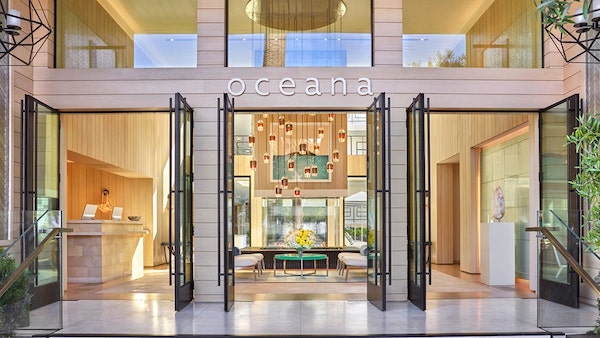Ocean Avenue hotel’s proposal defeated in deadlock vote
By Dolores Quintana
The Oceana Hotel’s second attempt to make their in-house restaurant available to the general public has narrowly been defeated last week in a Santa Monica City Council vote. The Planning Commission vote in June had an identical result as the City Council vote which was deadlocked with three yes votes and three no votes.
The crux of the issue is that The Oceana Hotel sits in an R2 and R3 zoning district which normally would not allow hotels to operate as they are zoned as low and medium density residential districts. The Oceana Hotel was founded in 1958 so it predates the current zoning ordinances and is therefore allowed to operate despite the zoning restrictions. The zoning ordinances do prevent the hotel’s restaurant from serving to anyone who isn’t a registered guest at the hotel. This creates the problem that the hotel cannot serve the neighborhood residents and become part of the local community’s food scene.
The difference of opinion is that some feel that the hotel should be allowed to increase its share of business by offering the neighborhood another food choice that might help them become more profitable as a small business. Some feel that this might embolden other businesses to ask for exceptions in residential zones too and that the opening of the hotel’s restaurant would disturb the peace and quiet of the neighborhood.
Council member Laura Negrete, whose small business has faced challenges during the pandemic was in favor of the exception and said, “As a small business owner myself, the more we put a chokehold on people for things like this, and the more we exclude our community in a post pandemic world, I think we’re doing ourself [sic] harm,” Negrete said.
The City Council members who voted no included Mayor Sue Himmelrich who didn’t oppose the exception for the hotel specifically, but voted no because the exception would have required a text amendment, which the Mayor opposes unequivocally. Mayor Himmelrich said, “I just want to say that I have nothing against this project and if we could have done it without a text amendment I probably would have voted for it, but I basically am opposed to text amendments,” Himmelrich said.
A text amendment would be required since the hotel is an exception to the current zoning ordinances. Text amendments do not allow for other similar exceptions to be granted, but Mayor Himmelright still believes that any text amendments are a “slippery slope” to businesses expanding their retail and commercial usage of space into residential zones.
Council member Oscar de la Torre originally seemed to be undecided which led to him making a request that the vote be delayed but this request was denied. Council member de la Torre was rebuked by Mayor Himmelrich because he had a sidebar conversation with Council member Phil Brock during the vote that was not conducted through the Council’s microphone system. De la Torre responded, “I was attempting to clarify the process. I was surprised to learn it would take multiple votes so it was a bit confusing. I needed more time to understand how the issues residents raised could be mitigated.” Both Council members De la Torre and Christina Parra voted no along with Mayor Himmelrich.
Councilmember Phil Brock, a nearby resident of the hotel, wavered from a yes vote to a no vote and then back again to yes.
“The ability to walk to a restaurant to me brings the community into the fold and makes it not exclusive, but rather inclusive,” said Brock, adding that while he generally opposes neighborhood densification he doesn’t believe opening the restaurant to the public would create negative impacts.
The deadlocked vote resulted in a denial of the text amendment since Council member Gleam Davis was not present to break the tie. A City Council vote requires a clear majority for the amendment to pass.













